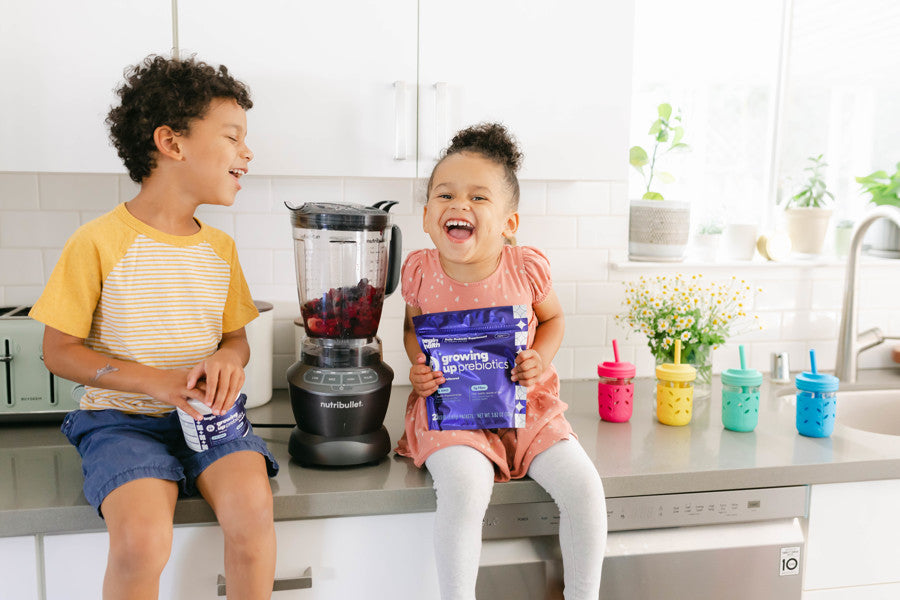Your Cart is Empty
Continue shoppingCan Toddlers Take Laxatives for Constipation?
Medically Reviewed by May Zhu, RDN | Published May 24, 2024
share this article

Constipation is not uncommon among toddlers and can cause discomfort and concern for parents. While laxatives are commonly used to relieve constipation in adults, many parents wonder if it's safe to give them to their kiddos. Let’s review what the current scientific literature reveals about the use of laxatives in toddlers.
What Constipation in Toddlers?
Constipation in toddlers is characterized by infrequent bowel movements, hard or dry stools, and difficulty passing stools. It can be caused by various factors, including diet, hydration, lack of physical activity, and underlying medical conditions. When dietary and lifestyle changes aren't enough to relieve constipation, parents may consider using laxatives under medical guidance.
Daily reads to help your little ones lead happier and healthier lives.
Buy Now
Join the
Happy Gut Club
Types of Laxatives for Toddlers
There are different types of laxatives available, each with its own mechanism of action. When considering laxatives for little ones, it's essential to choose a gentle and appropriate option. Here are some common types:
1) Bulk-Forming Laxatives: These laxatives work by absorbing water in the intestines, which adds bulk to the stool and stimulates bowel movements. Examples include psyllium husk and methylcellulose.
2) Osmotic Laxatives: Osmotic laxatives draw water into the intestines, softening the stool and promoting bowel movements. Examples include lactulose and polyethylene glycol (PEG).
3) Stimulant Laxatives: Stimulant laxatives stimulate the muscles of the intestines, causing them to contract and move stool through the digestive tract. Examples include senna and bisacodyl.
Safety Considerations for Toddlers Considering Laxatives
While laxatives can be effective for relieving constipation in little ones, their use should be approached with caution and under medical supervision. Here are some safety considerations to keep in mind:
1) Age Appropriateness: Not all laxatives are suitable for little ones. Some laxatives may not be recommended for toddlers due to their age or weight.
2) Dosage: The dosage of laxatives for little ones should be carefully calculated based on their age, weight, and severity of constipation. It's essential to follow the recommended dosage instructions provided by healthcare professionals.
3) Duration of Use: Laxatives should only be used for a short period, as long-term use can lead to dependence and other side effects. Once constipation is relieved, parents should focus on making dietary and lifestyle changes to prevent recurrence.
4) Underlying Conditions: Before giving laxatives to little ones, parents should consult with a pediatrician to rule out any underlying medical conditions that may be causing constipation.
Research and Expert Opinions
The American Academy of Pediatrics recommends dietary changes, such as increasing fiber intake and encouraging fluid consumption, as the first-line treatment for constipation in little ones [2]. Laxatives should only be considered if dietary and lifestyle modifications are ineffective.
Research from the Journal of Pediatric Health Care suggests that a comprehensive approach, including dietary changes, laxatives, and behavioral strategies, is one of the most effective strategies in managing constipation in little ones [3].
A review published in Pediatric Drugs emphasized the importance of individualized treatment plans for constipation in little ones, taking into account factors such as age, weight, and underlying medical conditions [4].
The European Journal of Pediatrics highlights the need for further research on the overall safety of laxatives in toddlers and kids to establish better guidelines for their use in clinical practice [5].
Summary
While laxatives can be effective for relieving constipation in little ones, their use should be approached with caution and under medical supervision. Dietary and lifestyle modifications are often the first-line treatment for constipation, with laxatives reserved for cases where these measures are ineffective. By working closely with healthcare professionals, parents can ensure the safe and appropriate use of laxatives for constipated toddlers.

Author
May Zhu, RDN
Trending

How to Transition Kids Off Stool Softeners Safely
read now
How to Know If Your Kid Needs a Stool Softener (or Something Else)
read now
Why Parents Are Choosing Prebiotics Over Stool Softeners for Kids
read now






